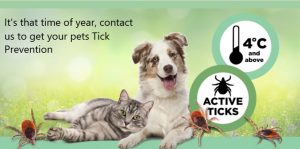We understand that the internet can be a huge source of information, but medicine is a particularly detail oriented discipline and many “non-official” sites exist with incorrect information that may cause you unnecessary stress and worry. A link to Veterinary Partner is provided here or on the right side of this page which can be accessed at your convenience. Veterinary Partner offers information to pet owners to provide them with a better understanding of their pets health.
Homemade Treat Recipes
Weight Management for Pets
Time to Start your Tick Prevention!
Pets and Heat Stroke
With hot summer weather here, it’s important to always be on the lookout for signs of heat stroke.
Heat stroke is a serious condition that occurs when the body can’t handle the external heat. It can cause illness, organ failure and can even be fatal.
Cats and dogs are easily affected by heat stroke as their bodies have limited ability to regulate their temperature. Pets pant and groom themselves in order to cool down but this often isn’t enough to maintain their regular body temperature.
Heat stroke is easily preventable, here’s how you can keep them safe:
- Never leave your pet in a car
- Monitor your pet while outside
- Always have water accessible
- Keep your pet inside on hot days
- Walk your pet in the mornings or evenings
- Use air conditioning, cooling pads or kiddie pools to help keep your pet cool
Overweight, short face and long or thick coated pets are more susceptible to heat stroke. Signs of heat stroke include excessive panting, muscle twitching, weakness, vomiting and diarrhea.
Take precautions and look out for these signs while continuing to enjoy the beautiful summer in Ontario!




